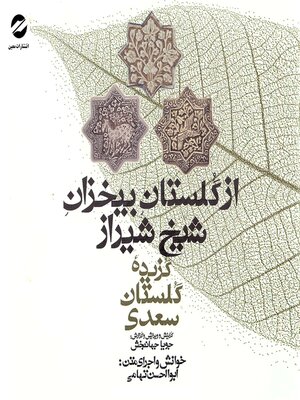Selections from Saadi's Gulistan
audiobook (Unabridged) ∣ Az Golestane Bikhazane Sheikhe Shiraz
By Sheikh Mosleh al-Din Saadi Shirazi

Sign up to save your library
With an OverDrive account, you can save your favorite libraries for at-a-glance information about availability. Find out more about OverDrive accounts.
Find this title in Libby, the library reading app by OverDrive.



Search for a digital library with this title
Title found at these libraries:
| Library Name | Distance |
|---|---|
| Loading... |
Gulistān (Persian: گُلِستان, romanized: Golestān, lit. 'The Flower Garden'; [golestɒːn]), sometimes spelled Golestan, is a landmark of Persian literature, perhaps its single most influential work of prose.Written in 1258 CE, it is one of two major works of the Persian poet Sa'di, considered one of the greatest medieval Persian poets. It is also one of his most popular books, and has proved deeply influential in the West as well as the East.The Golestan is a collection of poems and stories, just as a flower-garden is a collection of flowers. It is widely quoted as a source of wisdom. The well-known aphorism still frequently repeated in the western world, about being sad because one has no shoes until one meets the man who has no feet "whereupon I thanked Providence for its bounty to myself" is from the Golestan.
The minimalist plots of the Golestan's stories are expressed with precise language and psychological insight, creating a "poetry of ideas" with the concision of mathematical formulas.The book explores virtually every major issue faced by humankind, with both an optimistic and a subtly satirical tone.There is much advice for rulers, in this way coming within the mirror for princes genre. But as Eastwick comments in his introduction to the work, there is a common saying in Persian, "Each word of Sa'di has seventy-two meanings", and the stories, alongside their entertainment value and practical and moral dimension, frequently focus on the conduct of dervishes and are said to contain Sufi teachings. Idries Shah elaborates further. "The place won by the Golestan as a book of moral uplift invariably given to the literate young has had the effect of establishing a basic Sufic potential in the minds of its readers.







